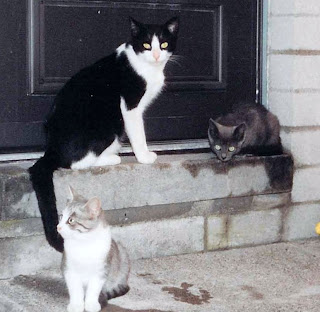Both groups seem caught off guard by the pregnancies – unaware that cats are persistent breeders starting as young as 16 weeks and
having 2 or 3 litters each year of 4-6 kittens per litter. And -- unlike dogs that go into heat once or
twice a year -- cats go in and out of heat every two weeks from February to
November– even when they’re nursing.
Once the kittens are born, the caregivers typically react
in one of two ways:
(1)
Scoop up the litter (and often Mom too) and
drive them to the nearest rescue or shelter to let them deal with the
problem. This is not a good idea on many
levels.
a. For
kittens to become “adoptable” they need to be well socialized and this cannot
happen in a shelter cage or in an overloaded foster home. While their personalities are forming (the
first 8 weeks of their lives) they need to have intense human interaction –
preferably from a variety of people – young, old, male and female – and they
need to learn to live in a home acclimating to typical noises like dogs, doorbells,
TVs, washers, etc. Your home – or that
of someone you know that immensely enjoys kittens – is a far better and
effective option than a shelter.
b. Mom
needs to be with her kittens for the first month – to feed and care for them –
and littermates need to stay together for at least two months so they learn they’re
cats and don’t grow up thinking they’re little “humans” because all they saw
during those formative weeks were people.
c. The
darker reason to hold on to Mom and her kittens is that in a shelter they often
stand a better chance of being euthanized than being adopted. Inadequate socialization, lack of foster
homes, stress-induced illness, overcrowding are all common reasons shelters
euthanize cats and kittens. And -- if Mom
is given to a shelter -- she’ll have to compete against younger, cuddlier kittens
for the few homes that adopt from shelters.
Less than 20% of pet cats are formally adopted. The rest are passed from person-to-person or
simply show up at someone’s door and move in.
(2)
Caregivers that don’t turn Mom and the kittens
over to shelters often embrace the kittens as part of an extended cat family
and want to hold onto all of them for the rest of their lives. This is typically a better option than
turning the family over to a shelter, but it can be a mine field too. To do this you must be able to make a
lifelong commitment to the cats and have the ability to get the entire group
spayed and neutered quickly to prevent follow-on litters. This is a steep financial and emotional
commitment – and one that is difficult to undo later on. The older the kittens get, the less adoptable
they become and the more dependent on your lifelong care they become.
We like a third option – keep the kittens in your home
until they’re 8-10 weeks old – and give them loads of love and affection. While you’re doing this, network with
everyone you know to find good homes for them -- preferably adopting them in
pairs so they stay with a litter mate.
Often simply giving them matching names (Ben and Jerry or Frick and
Frack, etc.) will ensure someone adopting one will want both.
Just make sure when you give them away that you like and
trust the caregiver who adopts them.
With all the care and love you put into their socialization, you’ll want
the best for them. And – if you know in
your heart the kittens will have a good life in their new home, giving them
away gets easier.
If any of the kittens don’t find good homes, hold onto
them – Mom will appreciate their company and you’ll know they’ll be well cared
for. And – most importantly – get Mom
fixed as soon as she’s done nursing so you can enjoy her without the worry of
more babies. Any kittens you end up
keeping should be fixed as soon as your vet will do it – typically around 12 to16
weeks of age.



No comments:
Post a Comment